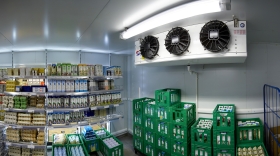

Today’s food retail environment is under immense pressure to improve efficiencies, with global megatrends including the fight against climate change, improving food safety while reducing loss, electrification and digitalisation of operations creating both opportunities and challenges within this sector.
“One of the major focuses within food retail today is the creation of smarter stores that are able to optimise their use of energy, help reduce food wastage and manage environmental impact and which are more sustainable,” said Thomas Michael Kolster, director of service innovation at engineering firm, Danfoss.
Speaking at the recent Southern African Energy Efficiency Confederation’s (SAEEC) annual conference, Kolster advised delegates that a connected system, which leverages the benefits of IIoT devices, platforms and applications, can deliver transparency and efficiency gains to the food retail environment.
He then outlined five technical strategies to help supermarkets not only stay ahead of society’s emerging demands but even to potentially benefit from them.
1. Sustainable refrigeration with the integration of CO2
CO2 is swiftly becoming the refrigerant of choice within food retail and it is now recognised as the most viable and efficient solution among natural refrigerants in food retail applications.
“CO2 offers superior energy performance over hydrofluorocarbons (HFCs), and when up to 60% of in-store energy consumption can be attributed to refrigeration, this environmentally-friendly refrigerant can help save up to 20% of energy in warmer climates like Africa, with zero impact on global warming.”
Danfoss’ latest innovation, the CO2 Adaptive Liquid Management (CALM) solution, can improve the energy efficiency of CO2 refrigeration systems, protecting compressors by pulling liquid refrigerant from the suction side and injecting it into the evaporator of display cases and cold rooms.
“A full year’s tests by German supermarket corporation the Edeka Group showed additional energy savings of 1200 Euros per year over more traditional CO2 systems, delivering not only efficiency gains but also improved controls,” Kolster explained.
2. Intelligent refrigerant monitoring = refrigerant leak predictions
Low refrigerant levels can cause ‘flash gas’ scenarios, where the opening of the valve lets in gas as well as the liquid. Because gas is less efficient at cooling than liquid, the opening degree increases. By using intelligent refrigerant monitoring, stores can establish a baseline for each case, which is then monitored independently and a detection algorithm will trigger an alarm for each case.
“The main benefits of intelligent refrigerant monitoring are early warnings of refrigerant leaks and the ability to store logbook files and visualise data,” explained Kolster. “The ability to predict leaks sooner brings with it the added advantages of greater equipment longevity, less spend on refrigerant refills and a more efficient system, which uses less power.”
3. Heat recovery deals with heat demand
Heat recovered from a CO2 refrigeration system is able to cover between 30 and 50% of heating demand within a store, without raising discharge pressures. Essentially, heat is recovered from refrigeration and can be used within the store itself, for space heating or hot tap water, or perhaps within a microgrid, like a shopping centre.
“We have worked with a Danish supermarket that is now able to fulfil 95% of heating demand from its own cooling display cases,” said Kolster. “Surplus heat in peak periods is fed into the district heating network and can heat up to 15 households within the neighbourhood.”
4. From energy efficiency to digital energy optimisation
There is intense pressure on operating margins across the board and the digitalisation of operations within stores can help them to leverage newer technologies and trends such as solar photovoltaic (PV) technology, e-mobility, blockchain, load shifting and more.
“In another real-world example, German supermarket Aktiv & Irma was able to use digitalisation and automation to reduce peak energy costs, using a combination of battery and cooling systems to reduce peaks (up to 40 kW) to save 15% on annual energy costs,” said Kolster.
5. Maintaining operational efficiency
Automatic and remote monitoring services can deliver cost savings through performance optimisation, reduced energy consumption and fewer service calls, he added.
“By optimising your entire store, through asset management, energy efficiencies, controls and alarms (for instance a high temperature alarm in a perishables case) and analysis to managed services, the advantages can include a lower cost of ownership, full transparency of assets and 24x7x365 alarm management,” outlined Kolster. “We saw quantifiable results from a Swedish food giant that recently rolled out the Danfoss monitoring and management solution across its entire supermarket chain. The company is already seeing a number of performance and efficiency benefits, including enhanced reporting and control; energy savings of between 400 to 500 kWh per store on a daily basis, equating to a daily energy saving of between 60 and 75 Euros per store; a reduction in service call outs of around 50%; and a project return on investment (ROI) of between two to three months.
“Danfoss has assisted the food retail business sector for many years, working with hundreds of food retail chains worldwide in more than 60 countries since the company was originally set up as Dansk Køleautomatik og Apparatfabrik in 1933.”

© Technews Publishing (Pty) Ltd | All Rights Reserved